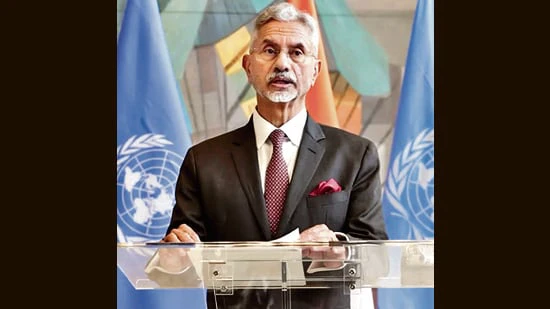Washington DC External affairs minister S Jaishankar, who began a three-day visit to the United States on Monday, said it is imperative to call out terrorism publicly when it is supported by a state against a neighbour and is fuelled by the bigotry of extremism.
Inaugurating an exhibition titled “The Human Cost of Terrorism” at the UN headquarters, the Union minister took a jibe at Pakistan in the aftermath of the Pahalgam terror attack, saying: “When terrorism is supported by a state against the neighbour, when it is fuelled by the bigotry of extremism, when it drives a whole host of illegal activities, it is imperative to call it out publicly and one way of doing so is to display the havoc that it has wreaked on global society.”
The ministry of external affairs said the “exhibition will highlight the devastating toll of heinous terrorist acts around the world, and the steps taken by the international community to combat terrorism”. The 1993 Mumbai bomb blasts, the 2008 Mumbai terror attacks and the Pahalgam terror attack are among the attacks put on display.
During the event, Jaishankar said: “This exhibition is a modest yet resolute effort to give voice to those who can no longer speak, a tribute to those who were taken away from us and a remembrance of the lives shattered by the scourge of terrorism.”
He stressed that the pain of the families of the victims of terrorism “is a stark reminder of the urgency of our shared responsibility to combat terrorism in all its forms and manifestations”.
“Terrorism is one of the gravest threats to humanity. It is the antithesis of everything that the UN stands for – human rights, rules and norms and how nations should conduct their dealings with each other,” he said.
Referring to the Pahalgam terror attack, Jaishankar said five weeks ago, the United Nations Security Council issued a “strong condemnation” of a “particularly horrific act of terrorism” and demanded that its perpetrators be held accountable and brought to justice. “We have since seen that happen. What that response underlines is a larger significance of the message of zero tolerance for terrorism. The world must come together on some basic concepts – no impunity to terrorists,” and “no yielding to nuclear blackmail,” he said.
“Any state sponsorship must be exposed,” he said, adding that “by now we know well that terrorism anywhere is a threat to peace everywhere. Let that understanding guide our collective thinking and response.”
According to the MEA, as part of the tour, Jaishankar will visit Washington DC and New York with the centrepiece of the visit being the Quad Foreign Ministers summit on July 1, to be hosted by US Secretary of State Marco Rubio, on Tuesday. Japan’s Foreign Minister Takeshi Iwaya and Australia’s Foreign Minister Penny Wong will also be in attendance. Jaishankar spoke with Wong over the phone in advance of the Quad meet.
“The Quad Foreign Ministers will build upon the discussions held during the last QFMM, which took place in Washington D.C. on 21 January 2025. They will exchange views on regional and global developments, particularly those concerning the Indo-Pacific, and review the progress made on various Quad initiatives in the run-up to the Quad Leaders’ Summit, which will be hosted by India,” according to a release issued by the ministry of external affairs. “The ministers are also expected to deliberate on new proposals aimed at advancing the shared vision of a free and open Indo-Pacific,” the release said.
According to people aware of the matter, Jaishankar is also expected to take up a series of bilateral meetings in Washington DC. The Quad Foreign Ministers’ meeting will build off the agenda of the January meeting with likely focus on maritime, economic, and technology security.
The Quad Foreign Ministers’ meeting will build off the agenda of the last meeting in January this year. Namely, the focus is likely to be on maritime, economic, and technology security with an added focus on resilient supply chains. The four top diplomats will also prepare for the Quad Leaders level summit which is set to be hosted in India later this year.
The Quad meeting comes at a sensitive time for the four-nation grouping. For India, this will be the first time Jaishankar will meet in-person with US Secretary of State Marco Rubio after the India-Pakistan military clashes in May. India and America have disagreed publicly over Washington’s exact role in negotiating a ceasefire between New Delhi and Islamabad. Added to this are concerns over the Trump administration’s decision to host Pakistan’s Army Chief Asim Munir in Washington DC this month.
Washington has also faced tensions with Australia and Japan. Tokyo reportedly cancelled a high-level 2+2 meeting with counterparts in Washington after America pushed for Japan to hike defence spending. America’s decision to review the AUKUS nuclear submarine pact has also caused some concern in Australia.
“It’s hard to ignore the fact that trade and defence disagreements loom over this foreign ministerial but there is an expectation these Quad partners will rise above their bilateral differences to focus on advancing their shared core concerns of technology cooperation, maritime security and a multipolar Asia,” says Sameer Lalwani, Non-Resident Senior Fellow at the Centre for Strategic and Budgetary Assessments.
“While Indian leaders may be understandably frustrated by recent US-Pakistan engagements, the Quad ministerial offers a path to higher status and resumed de-hyphenation. India has the opportunity to fully implement the Quad’s Indo-Pacific Partnership For Maritime Domain Awareness project which will burnish India’s credentials as a net-security provider in the Indian Ocean region,” Lalwani adds.
